Not everyone looking for good freelance writing jobs for beginners is an experienced writer. If you are a freelance developer, designer or consultant eager to grow your brand and make cash while you do it, it’s never too late to get started freelance writing.
This guide will give you a thorough plan to find freelance writing gigs quicker than you’d ever think possible.
While experienced writers have long been drawn to the opportunities in the gig economy, experts from other backgrounds are beginning to see potential in this area as well, and with good reason.
The ability to write clearly about your expertise allows solos across industries to establish greater credibility, grow their influence and capture new leads.
Related reading: How Many Different Freelance Careers Do You Know Of? We’ve Found Over 130 So Far
First, don’t say you can’t make money writing in the gig economy!
A growing number of highly successful freelancers are not trained journalists, and they’re quite open about this fact.
These professionals knew they liked to write. They had something unique to say or they viewed writing as central to their work. They knew it would be hard, but they didn’t let that get between them and the independent careers they dreamed of.
We sorted through all the gig economy statistics we could find, and several of them confirm that a good income is possible from high-skill freelance work.
According to MBO Partners’ most recent annual State of Independence survey, the average income for full-time professional freelancers is $65,300 versus a median household income in the U.S. of $56,516. One in five freelancers in their survey makes more than $100,000 per year.
In fact, the fastest growing segment of the freelance workforce are the highest paying quintile!
Not only that, the fastest growing segment of the workforce overall is freelancers at 5-6 percent per year. Money isn’t the only reason we are growing faster than the total workforce at .5 percent per year. Many of us choose freelance careers for lifestyle and work/life balance reasons. Some of us choose freelancing because we dream of becoming digital nomads.
But many of us “come for the flexibility and stay for the money.”
I’d always wondered if I could make it as a freelancer, so I took this change as a sign to give it a go. I had enough money set aside as a cushion for start-up costs and gave myself a deadline of a year to see if freelancing would be a viable option. Turns out everything went great, and I couldn’t be happier!

If you’re a freelancer, you’re almost always more diversified from a risk perspective than a traditional employee, because you presumably have multiple clients. If one dries up, you have other ways of staying afloat.
Dorie Clark, author of Entrepreneurial You

When you’re charging for your time and you don’t have to give a piece of that to anyone else, you can make much more.1 How it works out really depends on the individual circumstances, but you certainly can make more money.
Diane Mulcahy, author of The Gig Economy

“I wasn’t born a writer. I didn’t go to journalism school or get a ton of formal training. I was just a regular guy who sold software for a living.”

Really, how many clients do you actually need? You don’t need a hundred, you don’t need a thousand, you just need a few really good ones to keep your pipeline full on an ongoing basis.
“I liked to write. And I was pretty good at it. Sure I wasn’t a journalist by trade — psychology was my major in college — but I wasn’t afraid to roll up my sleeves and get my hands dirty.”

“When I had to answer “I’m an accountant,” I felt ashamed of myself. And not because there is any shame in being an accountant, or because accountants are to be looked down upon . . . It was merely because an accountant was never what I wanted to be, and that was never the life I had envisioned for myself.”

“Freelancers are taking a new place in the employment hierarchy . . . . These two stereotypes about freelancers—between jobs or disreputable wild cards—were never fair, but fewer and fewer people think of freelancers this way. The image of the independent contractor—especially when they are highly skilled knowledge workers—is undergoing a fundamental change that parallels changes in the nature of work.”

You can see a common theme here. Success as a new freelance writer comes from finding a passion that inspires you to keep growing and aligning this passion with the right opportunities.
Second, realize you are probably in demand
Content marketing fueled a huge demand for writers in the last decade, and it’s growing every year. According to the Content Marketing Institute, 70 percent of B2B marketers planned to create more content in 2017 than they did in 2016. You can bet they need help delivering on that goal.
While content writing is its own role of sorts (as you’ll see below), most freelance writing jobs, whether whitepaper writing or blogging, amount to branded content that someone is willing to pay for.
The growing demand for great content from businesses means a lot of new freelance writing jobs for beginners. If you are passionate and deeply interested in a specific topic or field, you have the ability to land freelance writing jobs.

Get real about rates for freelance writing jobs
It’s not easy to get solid reliable statistics on what freelance writing jobs pay. Most of us are operating at a disadvantage when it comes to pricing.
The Editorial Freelancers Association has some research-based data on freelance pay rates, but it’s somewhat out of date. The gig economy — and the content marketing that drives much of the work for freelance writers — moves fast.
The personal finance site The Balance is maintaining a more recent list of freelance writing rates.
And our friends at Contently have some good advice about calculating your rate by the hour and by the project.
We can tell you that we know people making more than the top numbers noted by the EFA. And there is some data out there confirming that at least some freelance writers are earning in that range.
For example, according to the Freelancing In America, 2016 survey from UpWork/Freelancers Union, 54 percent of freelancers who left traditional employment say they make more money now, 79 percent say it took a year or less to exceed their old income.
But you know what freelance writing services should pay? At least what it costs you to provide that service. This article shows you a formula for calculating your actual costs to provide a freelance service, which you can then use to set your freelance rates.
Know your options: 9 Freelance writing jobs for beginners

When I completed my university studies several years ago as a green-behind-the-ears freelance writer, I believed I was equipped to write newspaper articles and that was about it.
But there are so many great opportunities to make money freelance writing today, and many of these avenues have gained much greater prominence in the last few years.
The roles below are especially good freelance writing jobs for beginners, but you’ll also find some more advanced positions in the section that follows.
1. Freelance copywriter

A copywriter is a brand’s voice and sales presence on the front lines. Freelance copywriters need to say a lot with very little and understand the way their clients’ customers think.
What is copywriting? Technically, all the writing in any marketing or advertising material is copywriting, but in common usage, copywriting usually refers to the material that is most intentionally trying to persuade or most about the product or company. “Content marketing,” meanwhile — which we discuss below — is usually not so immediately tied to sales.
Copwriters work on landing pages with a definite sales pitch. They work on the “bread and butter” pages of a website that is in every navigation bar like the About page and How We Work page.
Therefore, copywriters are often working on the shortest marketing pieces but also the most intensely challenging pieces that require the most care.
As Benjamin Franklin is supposed to have said, “I have already made this paper too long, for which I must crave pardon, not having now time to make it shorter.”
Best suited to: ecommerce specialists, news journalists, scholars of psychology, people with sales and/or customer support experience.
Hacks for the copywriter: Google Ads and industry publications. Great copywriters immerse themselves in the industries of their dream brands — they study brand voices and keep themselves up to date on the latest marketing tactics in their industry niches. As you study, ask yourself which kinds of ads and deals would prompt you to take action.
2. Website content writer

Content marketing is popular because it’s the necessary answer to an outdated sales process.
Content writing can mean many things, but it often includes writing short blogs and long-form feature articles. Content marketing also often means conducting interviews and creating instructional or opinion pieces for the purpose of growing and educating a sales-ready audience.
Best suited to: Anyone with a journalism, sales, education, psychology, business, or search engine marketing background and anyone who is passionately curious or willing to learn about a niche topic.
Hacks for the website content writer: SEO tool free trials (Moz, Ahrefs, Spyfu, Long Tail Pro, etc.). What many aspiring freelance writers don’t realize about website content writing is that it isn’t just a writing and research job in isolation. It takes a solid understanding of SEO best practices to make yourself in-demand.
I recommend getting yourself a free one-week subscription to a keyword research tool and exporting a ton of competitor/keyword rank data relevant to your industry before approaching clients.
3. Email marketing specialist

This isn’t what many beginning freelance writers picture when thinking of paying gigs, but email marketing is an in-demand service.
According to Constant Contact 49% of small businesses do not employ email marketing simply because they don’t know where to begin with it!
You can change that and do a lot of valuable writing in the process (newsletters, lead magnet generation, welcome emails, press releases).
Best suited to: People with an agency background, ecommerce specialists, content writers.
Hack for the email marketing specialist: MailChimp, MailMunch and Beacon. You will really impress prospects if you have a keen understanding of email automation tools and can implement some simple list-building processes.
Lead magnet generation platforms like Beacon that can convert old blog posts into list-builders will also impress the heck out of your prospects.
4. Social media management

Social media management can be a great way to put strong writing, copywriting and marketing skills to good use. 80 percent of the companies Hootsuite surveyed in 2017 planned to conduct paid social marketing campaigns and plenty of them need help.
If you enjoy coming up with social posts, engaging with influencers and studying online demographics, start following sites like Mashable and Hootsuite’s blog, and offer to manage a client’s social media accounts for a low rate to get your bearings.
(And getting a basic understanding of Facebook Ads is also a huge plus.)
Best suited to: Community managers, anyone with a strong marketing or writing background, social media addicts.
Hack for social media managers: Hootsuite. This is a must-have free tool to automate your social planning and scheduling across multiple accounts. You can link three accounts for free and add several keyword feeds to easily comb these platforms for new outreach prospects.
5. Professional blogger
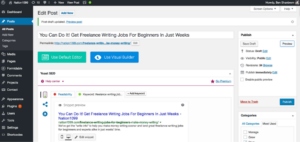
This can be an excellent way to make money writing. But it takes a good while to generate substantial revenue from it.
If you’re consistent with the quality and frequency of your content you can start making some income from your blog after 9 months-to-about a year. It may not be much, but . . .
You can turn it into a lot of income if you reach the point in which you’re reeling in 1000 visitors a day.
Even better, your blog, if it is truly thoughtful and authoritative, can help you attract clients for other kinds of freelance writing jobs!
(Listen to Robert McGuire on Ed Gandia’s podcast discussing how a serious but unprofitable blog become a “demonstration project” that lead to valuable paid writing jobs.)
Best suited to: Anyone passionate and patient.
Hacks for the professional blogger: HARO and Quora — You can start building your influence right now by contributing answers to HARO (Help a Reporter Out) and Quora’s boards on your niche topics.

Just because you’re a beginning freelance writer doesn’t mean you’re a novice in the working world.
Many high-paying freelance writing projects are tailored toward specialists who live and breath a certain expertise. Your in-depth understanding and unique insights in a given industry will allow you to stand out to prospective clients.
6. Technical writer
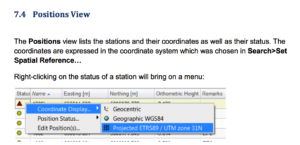
Skills developed in old jobs can have a funny way of paying off in completely different ways later.
You may not be a natural storyteller or a poet at heart, but if you can explain complex ideas to the average consumer, like navigating new software, you may be cut out for a lucrative writing career with retainer-based projects in technical writing.
Best suited to: Skilled content or copywriters in tech fields, product developers, software developers, tech enthusiasts.
Hack for technical writers: Elearning providers. The jury is out somewhat as to whether technical writers need to get STC certified (it usually helps for big corporate gigs), but one thing that’s perfectly clear is that you will need to LOVE learning for this role. E-learning vendors like Lynda, Coursera, Udemy and many others will have the exact intel you need to get your technical knowledge up to speed.
Related reading: 8 Best E-Learning Websites for Freelancers
7. Whitepaper writer
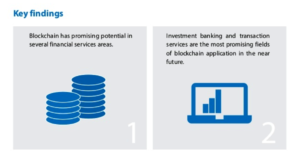
Whitepapers are essentially just another form of content writing, but clients often look for specialized writers for these jobs. Whitepapers are almost always used for B2B purposes, and they function as in-depth introductions to complex ideas or as a comprehensive look at a theme.
Some whitepapers take the form of case studies. Businesses want to show other businesses that their services really work so they hire freelance writers with excellent business writing and analytical skills to capture their successes.
One key skill needed to write whitepapers is synthesizing information from multiple sources and presenting that effectively. Just repeating other blog posts with different words won’t cut it here.
Often those sources are original research, original interviews or internal data that has never been published before. Therefore, a second important skill for writing whitepapers is the ability to ask good questions and to analyze data and other sources of information.
Best suited to: Journalists, B2B marketers, lapsed academics, data analysts, statisticians, people with deep expertise in a given professional field.
Hack for whitepaper writers: Google Alerts. You’ll need to keep up with your niche’s industry developments to give context to your whitepapers. Make your life easier and set up some Google alerts for keywords relevant to your niche to help you find your timely data and trends.
8. Managing editor / Content editor
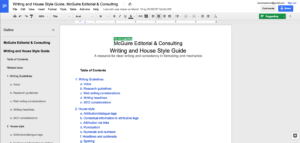
If you are proficient at editing your own blog posts, sourcing additional content and overseeing the full editorial process then you might want to work toward a managing editor role.
Freelance editors are the unsung heroes of the content marketing world. They document the process by which content is created, acquired and revised. They also help clients strategically create a vision and mission for their content.
While freelance editors obviously do more revising than writing, they often enjoy a steadier stream of income than many of their writing peers in the gig economy.
Best suited to: People who have served as either journalists, editors, proofreaders, agency managers or high-level writers.
Hack for managing editors: Google Drive. Google docs are a huge help as they allow for a collaborative editing process.
Also Trello. Managing editors are obsessed with Trello.
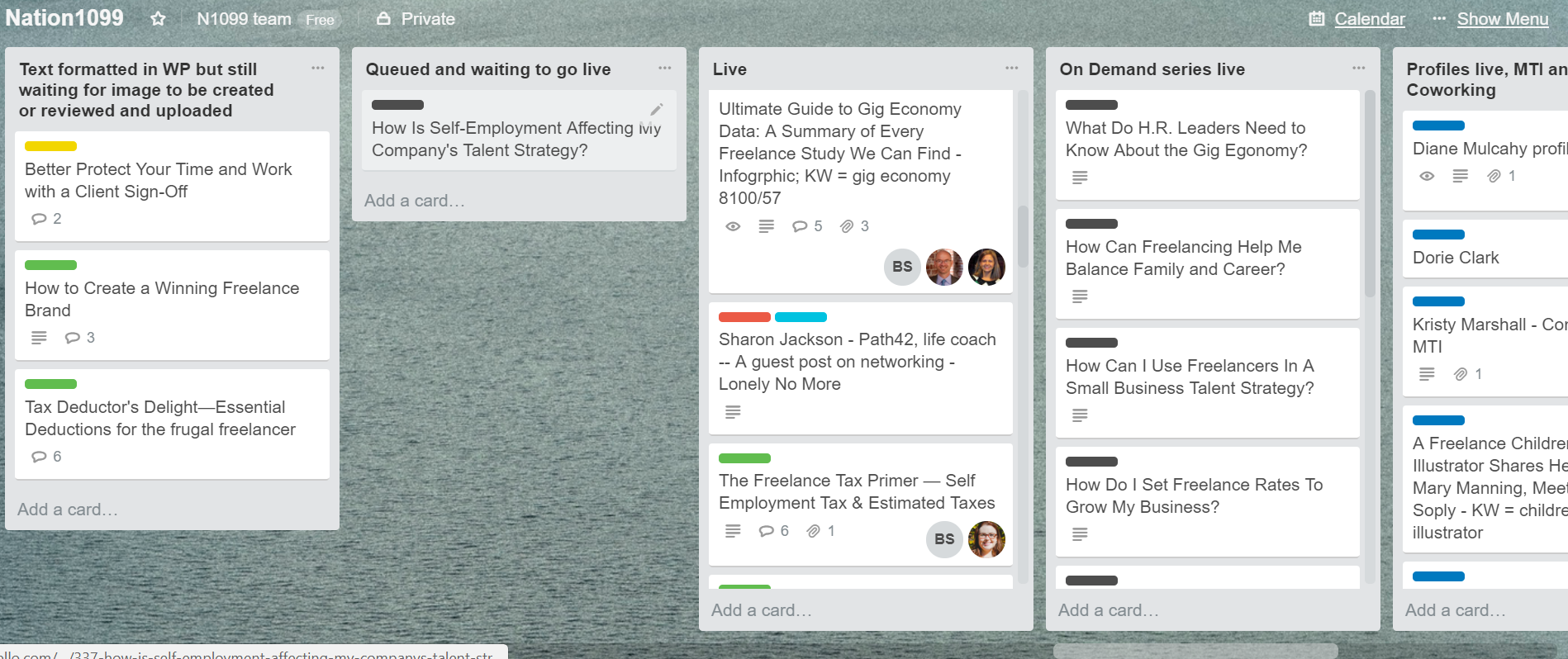
9. Freelance ghostwriter
Ghostwriting can provide an excellent source of freelance writing jobs for beginners.
There are some misunderstandings out there about ghostwriting. People often use the term when they are really talking about unsigned material that is just coming from a company’s voice.
True ghostwriting is when you try to capture the point of view and style of an individual. Usually these are very strong opinion pieces.
Experience with journalism helps here, because the basic job is to interview the “author” until you’ve dragged a really powerful idea out of them and they’ve made themselves clear to you. Then it’s your job to boil that down and make it clear to the audience in a way that helps establish the author as a thought leader.
This kind of ghostwriting is increasingly a part of content marketing strategy.
Best suited to: Journalists, aspiring novelists, strong storytellers, good listeners.
Hack for ghostwriters: Research, research, research. Before you interview the subject, know the topic so well that you can challenge them and provoke them into going new directions with their ideas.

5 tips to start finding freelance writing jobs for beginners
Your unique background and interests play a very important role in determining which freelance writing jobs are best for you.
1. Get a niche
You can certainly be a generalist and get some freelance writing jobs, but you probably won’t get work you’re enthusiastic about. If you start off without even a niche to aspire to, you will fall into what Ilise Benun a.k.a. “The Marketing Mentor” calls the “word-of-mouth” trap.
Freelance writers who simply take whatever comes along fall into a vicious cycle of writing about topics they don’t enjoy.
They also do not earn themselves the profitable clients they’re cable of getting. In short, generalizing is a bad way to make money writing.
Aspiring freelance writers should ask themselves “What am I really interested in?” and “What are the kinds of things I truly want to write about?”
You won’t always get work that falls within those parameters, and that’s fine. But you’ll know where to devote the bulk of your research and which kinds of gigs are worth going all out for.
2. Create a unique brand
Your professional identity as a freelance writer shouldn’t be stamped from a mold. While we need to be professionals in certain key respects (using proper grammar, consistently making deadlines, treating clients with respect), we can be ourselves — really it’s okay!
Being true to who you are and your unique background and personality is actually one of the best ways to stand out as an aspiring freelance writer.

We recently interviewed Jorden Roper (The Cutthroat Copywriter) for our Meet The Indi freelancer profile series and not just because she’s a successful writer, but also because she illustrates the difference an authentic and impassioned freelance brand can make.
I highly recommend reading over her interview on brand communication to get a clear idea of what constitutes an outstanding brand and how it can help you.
3. Build up foundational skills

While there are plenty of freelance writing jobs to consider, you will gain a serious advantage over your competition if you can offer potential clients some baseline competencies in related areas.
Blog posts need to be formatted, articles need a keyword focus and, more than ever, content needs solid visual elements like illustrations, charts and infographics to keep readers engaged.
If you can do some of these things, that means fewer to-do’s for clients and more opportunities for you.
I can’t tell you the number of times I’ve been able to to charge clients more or even raise my freelance rate with long-standing clients because I offered to help them a little with their social posts or other necessary tasks.
When you do more than just write, you gradually become indispensable to clients.
For these reasons I highly recommend learning a bit about:
• Graphic design (yes, even understanding how to use a tool like Canva counts!)
• SEO
• WordPress formatting
• Social media
• Web development
4. Get really good at interviewing
Once you have your first freelance writing job, you want to do well and provide a lot of value so that you get more gigs.
One way to separate yourself from the pack is to make sure you provide new and original information. Because the dirty secret is that too much content marketing out there is a lot of clever and well-crafted sentences that don’t say anything non-trivial or non-obvious. Too much of it is a re-hash of available information.
Where do you get new and original information?
By asking people for interviews. Treat your freelance assignment like a journalist would treat it by getting experts to speak on the subject.
The point is to get them saying something that hasn’t already been written.
5. Get really good at editing your own work
Keep repeating this mantra: “There are no rules to writing. There are only rules to rewriting.”
The good news is that you have permission to plow forward and make a mess in the first draft.
The bad news is that you have a lot more responsibility for later drafts than you may have expected.
Too many inexperienced freelance writers turn in their work too early before it has been sufficiently rewritten. They try to give responsibility to the editor for work they should have taken care of themselves.
This is more than a matter of turning in “clean copy” without typos in it. It’s a matter of taking a critical look at your draft to see if it delivers the goods. Does it provide helpful and clear information? Does it present it in a clear way? Is it fully developed?
The more you clean up first-draft problems yourself, the more your editor will appreciate working with you. The more time that your editor has to spend fixing your first-draft problems, they less likely they are to reach out to you again.
4 ways to make money freelance writing

And there are A LOT of avenues to pursue freelance writing jobs for beginners.
It took me a few years to find the high-quality writing gigs I was looking for by sifting through Craigslist posts.
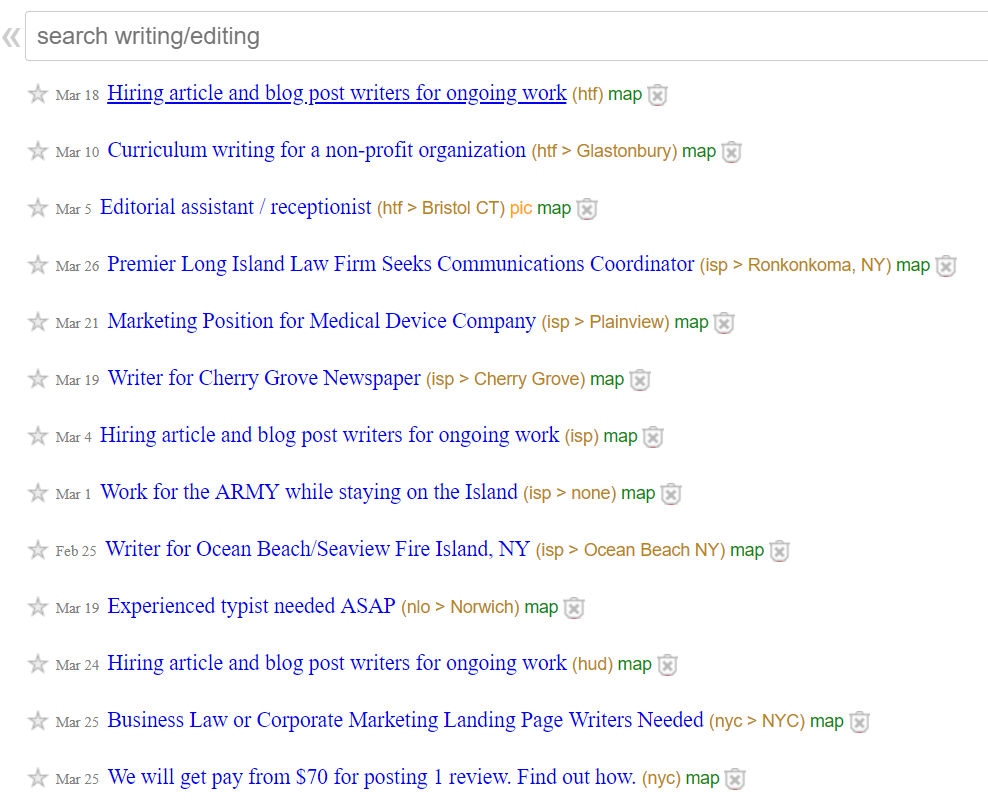
But if you’re more clever than I was (and do some proactive outreach) you can land awesome projects much sooner.
These are the most helpful strategies for landing writing work that I’ve learned.
1. Engage high-level freelancers as potential subcontractors
One of the best ways to grow as a solopreneur is to connect with other freelancers and delegate work to them.
Related reading: The Ultimate Guide To Hiring Subcontractors
Many new freelancers feel demoralized when starting out because they see so many of their peers who started sooner and are much farther along in their solo ventures.
This is precisely the wrong way to look at your new freelance writing career. Established freelancers are not your competition. They are your foot-in-the-door!
Many of them need help as they take on bigger clients and you can be that help. Working with more experienced freelance writers can turn into a dependable way to make money writing when starting out.
Hack: Twitter / Email. The first step here is building relationships. Start off by following prominent freelance writers on Twitter. Share their content, tweet to them, pitch them on guest posts. Show them that you’re capable and take initiative, and they may just want to work with you.
Related reading: The Best Subcontractor Agreement Templates
2. Pitch to publications you respect
This is the most traditional approach, but one that shouldn’t be discounted.
Publishing articles in respected outlets in your industry (along with active social media upkeep) are two of the biggest indicators of credibility for potential clients.
Remember for whatever you pitch — you need a unique take on the subject!
Hack: Google Search “[outlet] write for us”. I learned about this trick from Neil Patel and it’s a great way to find places that are looking for freelance writers. Make a list of publications that you most wish to write for and search these outlets’ names with the words “write for us.” You’ll quickly find the pages containing their contributor policies and will be able to assess which prospects make the most sense to pursue.
3. Don’t overlook the power of your local business community

Many new freelance writers make peanuts when they start out because they confine themselves to work for publications alone.
If you know feature writing is your passion and you want to get published in glossy newsstand publications, that’s great. But if you don’t mind doing some additional commissioned work for businesses, then you can pretty quickly make freelance writing a full-time job, as opposed to a side hustle.
Local businesses — especially agencies and start-ups in your local area — are almost always looking for high quality freelance writers of web content, landing page copy and whitepapers.
Hack: Use a start-up search tool like StartUpHire’s job browse feature to find growing companies in your area. Reach out to them about the writing work you’re looking to do. You’ll be especially convincing if you can make specific suggestions about improving their messaging.
4. Use high-quality freelance marketplaces

While freelance marketplaces are not intended to fully sustain a freelance writing career, they can lead to a lot of solid freelance writing jobs for beginners. Writing boards can be iffy, but if you’re open-minded and a little discerning, you’ll find some really good resources out there.
Check out our extensive list of 35+ freelance websites [updated and expanded monthly] and pay special attention to the “exciting new-comers” and writing-specific categories.
Many of these options have better opportunities for higher-paying and more prestigious work than the well-known free-for-alls.
We also have put together a list of websites for consulting jobs that cater especially to high-level knowledge workers in the gig economy.
For finding freelance writing jobs for beginners I recommend:
Textmaster: A solid bread and butter freelance writing board
Workmarket: A newer app-based freelancing platform with a wide variety of writing and marketing gigs
Skyword: A discerning but accessible freelance writing outlet specializing in content marketing
Scripted: A high tier freelance writing board that offers a small percentage of approved writers a steady flow of assignments
Related reading: Skyword’s Advice on Building a Killer Online Portfolio for Freelance Marketplaces
For some of these options, it will be important to “build your byline” and create a history for yourself of quality work done for other outlets, and even your own blog (see the next section).
But if you don’t have a huge portfolio as a freelance writer, recognize that it isn’t just writing experience that gets you the gig — relevant work experience can speak volumes.
Hack: One the most simple ways to stand out to potential clients on freelance platforms is to create an attractive online resume/website that succinctly showcases your best writing, positive feedback from clients and extensive experience within a chosen niche.
Write for yourself and you’ll make money writing sooner
Obviously, if you landed on this page, you’re looking to make money writing — emphasis on the “make money” part.
While this can happen quicker than you expect in rare cases, it generally takes time to build up a reputation and a portfolio of example work.
This is where the temptation to write for free comes in. But as our colleague Robert McGuire often says, the only person you should work for free for is yourself. In this interview on Ed Gandia’s High-Income Business Writing podcast, Robert talks about the power of demonstration projects to build skills, build a portfolio and build relationships with potential clients.
Building a website with your own vision and passion is a much better approach than supplying free blog articles to scammy websites.
I discussed the long-term merits above of starting your own blog as soon as possible and beginning to build your expertise. By regularly creating high-quality content for your blog, you increase your perceived credibility and give potential clients the confidence they need to take a chance on an enthusiastic newby.
You can’t control a prospect or publication’s decision, but you can always choose to make your career happen.

Ben Shanbrom is a freelance writer, musician and copy editor who works with artists and other clients around his native New Haven and well beyond.














Great article, hey Jorden Roper has a new site since this was written. I am taking her kick-ass cold emailing course package right now.
Clients want to see the quality of your writing before they give you their projects.
So the easiest way to create your writing sample about your niche is to create a blog about the niche and give the link of your blog post to your client.
I recommend creating a free blog or website with the specific niche